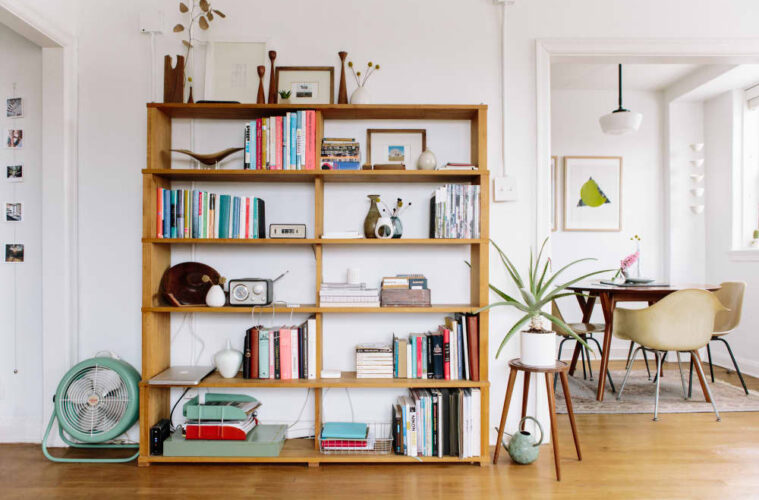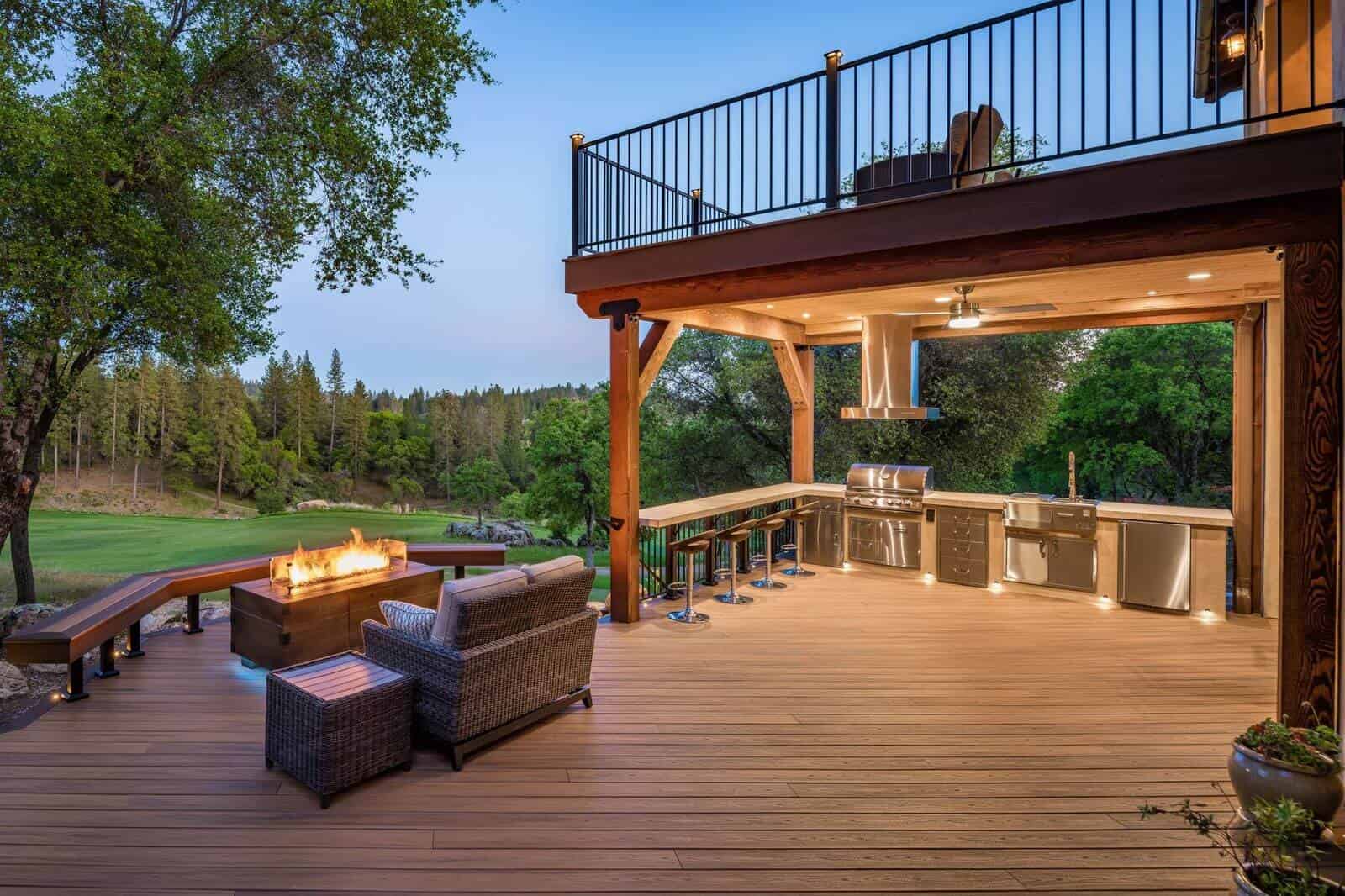Add storage and style to your home with DIY built-in bookshelves. You can save thousands by building them yourself instead of hiring a professional carpenter.
This project uses IKEA base cabinets as the foundation for bookshelves that extend almost to the ceiling. Crown molding and a fresh coat of paint finish the look of this stunning wall of shelving.
Design Your Shelves
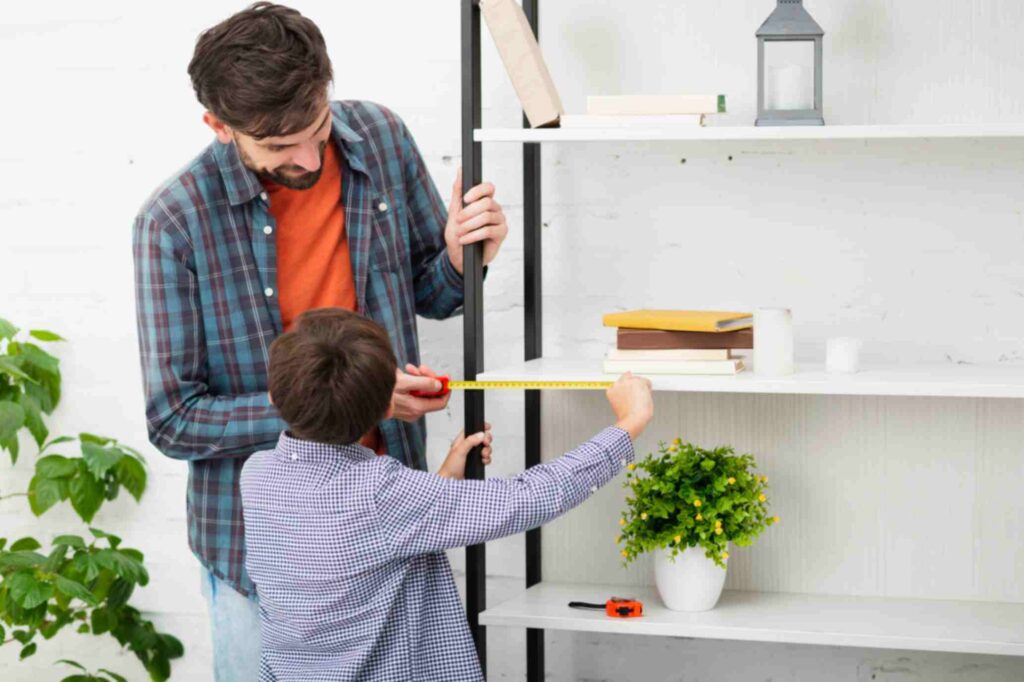
Shelving offers a unique opportunity to express your personal style and showcase your favorite possessions. Properly arranged, shelf decor can make a beautiful statement and elevate your home’s architecture. Whether you are designing a bookcase for an office nook, a dining room buffet, or a set of built-in shelves in the living room, these shelf styling tips will give you everything you need to create your dream display.
Start by clearing the shelf and laying out all of your objects to get a clear sense of what works where. LUDC Senior Designer Shannon Smith notes that this approach allows homeowners to view their possessions in a new light and find inspiration for the arrangement. She also suggests beginning with larger objects, such as artwork or a framed photo, to create a foundation for the remainder of the shelving and work from there.
Vary the heights of objects to create interest on your shelf. For example, Studio McGee uses vases, plants, bowls, art, and decorative plates to add visual weight on their built-in shelves and create a focal point. The team also varies the width of these large decor pieces by staggerng them rather than stacking them all on top of each other.
Using different textures on your shelf can also help to add interest and depth to the design. Adding in woven baskets, velvet cushions, or textured vases can instantly elevate your shelf and add texture to the overall look of the space.
Find the Right Wall
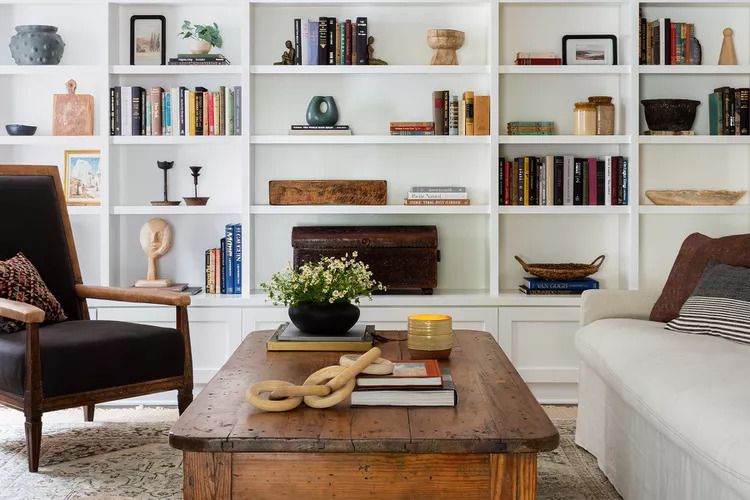
Source – marthastewart
A well-designed built-in bookshelf is a great addition to your home. It not only adds extra storage for books and knick-knacks, it also adds visual appeal to the room. However, it can be a daunting task to design and build your own shelves. The key is to start with the right plan so that your custom shelves are the perfect size for your space and will look professional.
Once you’ve figured out how many shelves you want to create and where in the room you’re going to put them, it’s time to take measurements. Be sure to include the height of the ceiling in your calculations. Next, decide what type of wood to use for your shelves. Hardwood is a durable choice, but it can be expensive. Using pine instead can help you save money while still giving your shelving the appearance of hardwood.
Another important consideration is how tall you’re going to make your bookshelves. It’s not always necessary to go as high as a person’s head, but you want to make sure the shelves are not too low so that you can reach your items easily.
Once you’ve designed your shelf and figured out the dimensions, it’s time to start building. The frame is made of two primary sets of parts – the case and the face frame. The case includes side panels (with shelf-pin holes for the adjustable shelves), a top, and a bottom. The face frame is simply a piece that goes around the edge of the case to cover the exposed plywood edge grain and give it a more finished appearance.
Work With Your Home’s Architecture

Adding built-in bookshelves in a way that works with the existing architecture of a room can help the shelves look more integrated. For instance, incorporating a window seat into your bookcases as home office seating is one easy way to create a reading nook with custom storage. This design by Katies Hodges features a soft gray paint color, eyelet cabinet cutouts, and a whimsical chair and mirror for a sweet yet practical home work space.
Using the same materials throughout your DIY built-ins can help you achieve a polished look. This shelving plan, for example, uses IKEA base cabinets and adds custom shelves above, all while concealing electrical wiring behind a header. The use of similar wood in the frame and shelves keeps the look cohesive.
Another way to add more visual intrigue to a DIY bookshelf is by using varying shelf heights. Asymmetry makes a room feel more live-in and adds interest to the display. This home library from designer Molly Williams is a great example. Shelves of varying heights are framed by a decorative sliding ladder for an interesting mix of items.
When designing the build-up frame for your shelves, be sure to pay attention to the grain direction of the plywood you’re using. This will ensure that your shelves look even more beautiful when they’re filled with books and other decor items.
Make the Most of Your Space
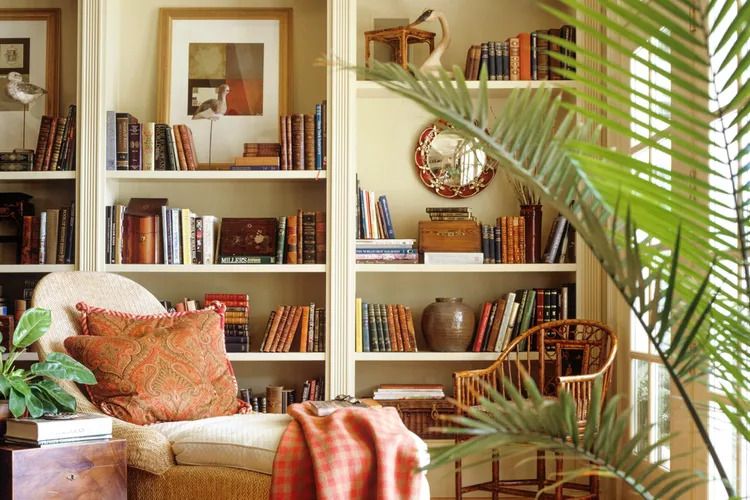
Source – marthastewart
When designing your built-in bookshelves, you can go above and beyond simply storing and displaying books. Consider adding trim details like chair rail or crown molding that will anchor the shelves and create a cohesive look with the rest of your home. Decorative touches like an arched trim piece, a beautiful wallpaper, or even a unique lampshade can also add color, depth, and texture to your shelf design.
When putting together your diy built-in bookshelves, take the time to calculate how deep each shelf should be. You will need to account for the weight of your books and any other items you plan on storing, such as bulky board games or lidded baskets. Using a simple online sag calculator can help you determine the best shelving depth for your project.
A good rule of thumb is to keep the bottom shelves deeper and the top shelves shallower. This will allow you to accommodate a larger volume of items while maintaining an attractive visual balance. Staggering the placement of books will add interest and give your shelves a collected-over-time look. When decorating your built-in shelves, it is important to use a paint that can withstand humidity and moisture. If your bookcases require painting, make sure to thoroughly sand and prep them before doing so. Also, be sure to fill any holes with wood filler and touch up the area before painting.

